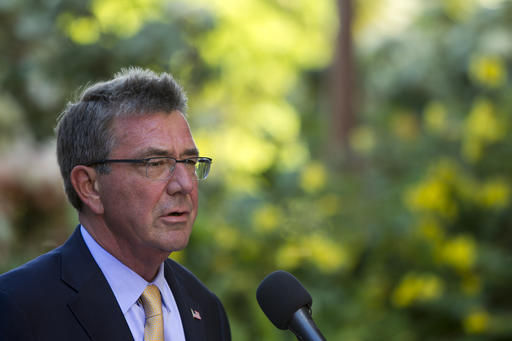
U.S. Defense Secretary Ash Carter speaks at a press conference during a defense ministers meeting of ASEAN , Friday, Sept. 30, 2016 in Kapolei, Hawaii. AP PHOTO
KO OLINA, Hawaii—US Defense Secretary Ash Carter on Friday opened talks in Hawaii with his counterparts from 10 Southeast Asian nations, even as US relations with the Philippines, a longtime American ally, grew shakier.
In opening comments to the meeting at a seaside resort on the island of Oahu, Carter said he wanted to encourage more regional cooperation in Asia and the Pacific on key issues like maritime security and combatting terrorism.
As part of a broader Obama administration push to “rebalance” its security interests by paying greater attention to Asia and the Pacific after 15 years focused mainly on the Middle East, Carter is pitching the idea of an Asian security “network.”
“The network will help us uphold important principles like resolving disputes peacefully; ensuring that countries can make their own choices free from foreign coercion and intimidation; and preserving the freedom of overflight and navigation guaranteed by international law,” he said.
A more immediate issue not mentioned by Carter in his formal remarks, however, was a steep deterioration in relations with the Philippines.
When Carter visited the Philippines in April, he praised the strength of the partnership. Earlier this week in San Diego he called US-Philippine defense relations “ironclad.”
That seeming closeness took a sharp downturn when Rodrigo Duterte was elected president in June. In early September, President Barack Obama canceled a meeting with Duterte after the Philippine leader publicly called him a “son of a bitch.” Later, Mr. Duterte said he regretted the comment.
Last war drill
Earlier this week, Mr. Duterte said joint military exercises of Filipino and American troops scheduled for next week would be the last such drill, although his foreign secretary quickly said the decision was not final.
Mr. Duterte said the Philippines would maintain its military alliance with the United States because they shared a 65-year-old mutual defense treaty.
And on Friday, Mr. Duterte brought the rhetoric over his bloody anticrime war to a new low, comparing it to Hitler and the Holocaust and saying he would be “happy to slaughter” three million addicts.
Aides to Carter said he likely would seek clarification in Hawaii from his Philippine counterpart, Delfin Lorenzana, regarding the future of US-Philippine military exercises. Lorenzana is well-known to US officials after serving for more than a decade at the Philippine Embassy in Washington prior to taking the defense portfolio after Mr. Duterte was elected.
Extremist threat
Meanwhile, Singapore Defense Minister Ng Eng Hen said the threat that violent extremist groups posed to Southeast Asia was growing each year as they became more organized and focused in their aims.
Ng was speaking to reporters following the meeting of Southeast Asia defense ministers with Carter in Hawaii.
The defense chiefs devoted a major chunk of time to discussing the threat from the Islamic State (IS) and similar groups.
Security officials said in June that Southeast Asian militants who claimed to be fighting for IS said they had chosen one of the most wanted men in the Philippines to head a regional faction of the group.
Over 1,000 Southeast Asians have flocked to join IS’ self-declared “caliphate” in Iraq and Syria, Ng said.
“Every year we meet, the situation and threat from extremist terrorism rises,” Ng said. “Compared to, say, a year or even two years ago, they’re more organized… they’re more networked, they’re more clear in their articulation of what they want to achieve.”
Jakarta attack
Authorities in the region have been on heightened alert since IS claimed an attack in the Indonesian capital Jakarta in January in which eight people were killed, including four of the attackers.
Ng cited a recent plot in which an Indonesian cell coordinated by an IS member in Syria had planned to shoot up hotels in Singapore’s Marina Bay area. The plot was foiled by Indonesian authorities, he said.
“They have gone beyond networks to push the flow of funds, weapons. They are already plotting,” Ng said.
US defense officials believe that hundreds of citizens from Southeast Asia have returned to their home countries after joining IS in Iraq and Syria, raising concerns that they may try to launch a wave of attacks. AP, AFP
RELATED STORIES
Duterte’s Hitler remarks ‘deeply troubling,’ says Pentagon chief
US Embassy press attaché has hands full

